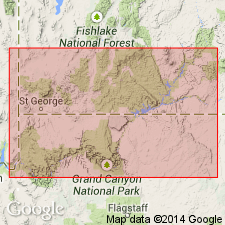
- Usage in publication:
-
- Harris Wash Tongue*
- Modifications:
-
- Named
- Dominant lithology:
-
- Sandstone
- AAPG geologic province:
-
- Paradox basin
- Plateau sedimentary province
Summary:
Named as a tongue of Page Sandstone (new) of San Rafael Group for Harris Wash. Type section measured on west side Halfway Hollow about 0.8 km from Harris Wash in NE1/4 SE1/4 NE1/4 sec 26, T36S, R4E, Garfield Co, UT in Paradox basin. At type is an 18.3 m thick reddish-brown sandstone that is fine grained, moderately to well sorted, laminated to very thin-bedded and ripple cross laminated; a few scattered white to orange chert pebbles along base; overlies J-2 unconformity which is at top of Navajo Sandstone. Underlies Judd Hollow Tongue (formerly of Navajo Sandstone) of Carmel. Thins westward on Kaiparowits Plateau, Kane Co, Plateau sedimentary province and along Waterpocket monocline, Garfield Co. Maximum thickness of 36.6 m near Escalante. Pinches out 45 km northwest of Page. Is probably the only part of Page present in San Rafael Swell. Correlates with limestone member of Carmel Formation at Mount Carmel Junction, UT and with Sliderock Member of Twin Creek Limestone in WY and UT. Of late Bajocian, Middle Jurassic age. Correlation chart. Cross sections. Measured sections.
Source: GNU records (USGS DDS-6; Denver GNULEX).
For more information, please contact Nancy Stamm, Geologic Names Committee Secretary.
Asterisk (*) indicates published by U.S. Geological Survey authors.
"No current usage" (†) implies that a name has been abandoned or has fallen into disuse. Former usage and, if known, replacement name given in parentheses ( ).
Slash (/) indicates name conflicts with nomenclatural guidelines (CSN, 1933; ACSN, 1961, 1970; NACSN, 1983, 2005, 2021). May be explained within brackets ([ ]).

